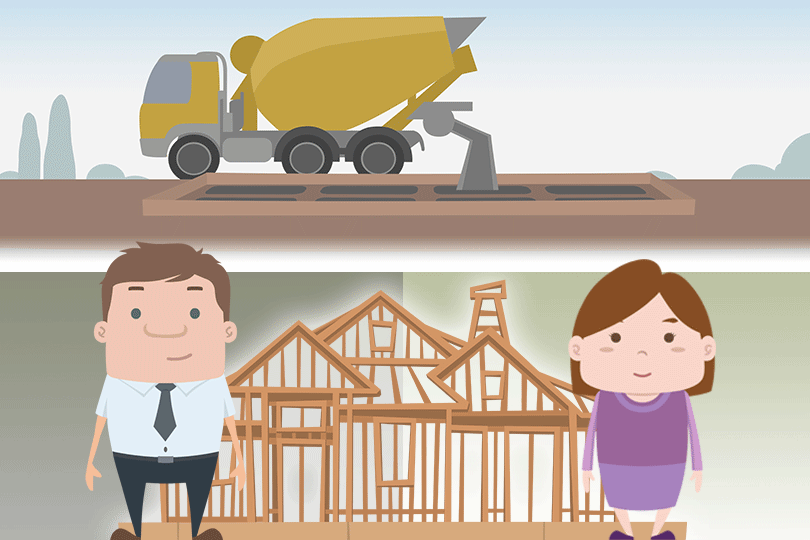Why FHA One-Time Close Construction Loans Are Different

Compare that process to the FHA Construction loan journey. Building from the ground up on your own lot is rewarding, but time consuming. Construction loans may cost more, and you won’t be able to use the property until the construction phase is done.
There are other important differences. FHA borrowers worried about closing costs and the down payment may have difficulty with the financial requirements to build. If you have cash reserves, and you do not mind waiting until construction is finished, building a home with an FHA loan may be a great investment.
There are other, less obvious ways FHA construction loans differ from buying an existing home. One is the number of third parties you may need to work with along the way.
When you purchase an existing home, there is a seller, a borrower, and your loan officer. You will also need to pay an appraiser and a home inspector.
But construction projects require you to find a builder and other third parties needed for inspections, ordering materials, and other tasks. Expect to work as closely with your builder in some parts of the project as you do with the lender.
Those buying existing construction homes also do not have to do research on a builder or provide the lender with builder qualifications, estimates and timelines, and related issues.
When building a home, you will need to review the contractor’s online reputation, builder’s insurance, work history, and look at blueprints, construction plans, timeline, etc. Your loan officer is likely to request all of the above, too.
Some people read all of this and still are not sure if a construction loan is right for them. One important thing you can do is to get prequalified for the loan BEFORE you start searching for plans and contractors.
Did you know that many participating FHA lenders won’t approve a construction loan that requires down payment assistance to move forward? That is a good example of the things you will want to know before you pay for plans or commit to a project.
Talk to a lender before you commit to the process in any way. Construction loans do require higher FICO scores and have more strict credit requirements overall. Learn the expectations before you start your research--you will not regret it.
 FHA, VA, and USDA: One-Time Close Loans
FHA, VA, and USDA: One-Time Close Loans
Want More Information About One-Time Close Loans?
We have done extensive research on the FHA (Federal Housing Administration) and the VA (Department of Veterans Affairs) One-Time Close Construction loan programs. We have spoken directly to licensed lenders that originate these residential loan types in most states and each company has supplied us the guidelines for their products. We can connect you with mortgage loan officers who work for lenders that know the product well and have consistently provided quality service. If you are interested in being contacted by a licensed lender in your area, please send responses to the questions below. All information is treated confidentially.
FHA.com provides information and connects consumers to qualified One-Time Close lenders to raise awareness about this loan product and to help consumers receive higher quality service. We are not paid for endorsing or recommending the lenders or loan originators and do not otherwise benefit from doing so. Consumers should shop for mortgage services and compare their options before agreeing to proceed.
Please note that investor guidelines for the FHA and VA One-Time Close Construction Program only allows for single family dwellings (1 unit) – and NOT for multi-family units (no duplexes, triplexes or fourplexes). In addition, the following homes/building styles are not allowed under these programs, including but not limited to: Kit Homes, Barndominiums, Log Cabin Homes, Shipping Container Homes, Stilt Homes, Solar (only) or Wind Powered (only) Homes, Dome Homes, Bermed Earth Sheltered Homes, Tiny Homes, Accessory Dwelling Units, or A-Framed Homes.
Contact Us: Send Us Your Request – Spam Safe
Please send your email request to [email protected] which authorizes FHA.com to share your personal information with one mortgage lender licensed in your area to contact you.
1. Send your first and last name, e-mail address, and contact telephone number.
2. Tell us the city and state of the proposed property.
3. Tell us your and/or the Co-borrower’s credit profile: Excellent – (680+), Good - (640-679), Fair – (620-639) or Poor- (Below 620). 620 is the minimum qualifying credit score for this product.
4. Are you or your spouse (Co-borrower) eligible veterans? If either of you are eligible veterans, down payments as low as $0 may be available up to the maximum amount your debt-to-income ratio per VA will allow – there are no maximum loan amounts as per VA guidelines. Most lenders will go up to $1,000,000 and review higher loan amounts on a case-by-case basis. If not, the FHA down payment is 3.5% up to the maximum FHA lending limit for your county.

Do you know what's on your credit report?
Learn what your score means.







